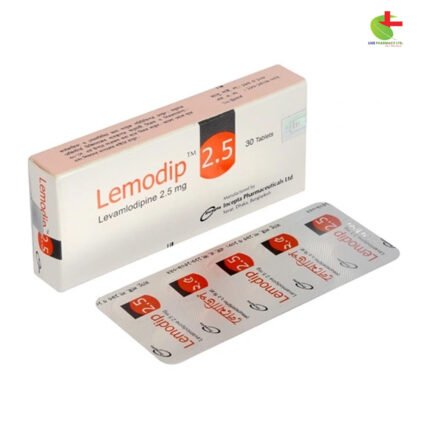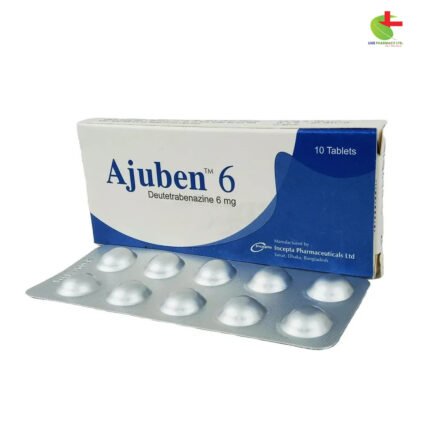Kanopas 10
650.00৳ Strip (10)
- Kanopas is a nonsteroidal mineralocorticoid receptor antagonist.
- Used to reduce the risk of kidney disease progression, heart failure hospitalizations, and cardiovascular events in CKD and T2D patients.
- Blocks overactivation of receptors involved in inflammation and fibrosis, contributing to CKD and heart disease.
- Administered orally, with regular monitoring of potassium levels and kidney function during treatment.
 Brand
Brand
|
Incepta Pharmaceuticals Ltd |
|---|---|
 Generics
Generics
|
Finerenone |
 Type
Type
|
Tablet |
Indications
Kanopas is prescribed to reduce the risk of kidney disease progression, cardiovascular death, nonfatal heart attacks, heart failure hospitalizations, and end-stage kidney disease in adult patients with chronic kidney disease (CKD) and type 2 diabetes (T2D).
Always use under the guidance of a registered healthcare professional.
Pharmacology
Finerenone is a potent, nonsteroidal, selective mineralocorticoid receptor antagonist (MR) that blocks aldosterone and cortisol from overactivating the MR in tissues such as the kidneys, heart, and blood vessels. By inhibiting MR overactivation, Finerenone helps reduce inflammation and fibrosis, critical factors in CKD and heart disease.
After oral administration, Finerenone reaches peak plasma concentration in 0.5 to 1.25 hours, and it is primarily metabolized by CYP3A4 enzymes. It has a bioavailability of 44% and is largely excreted via urine.
Dosage & Administration
The typical starting dose of Kanopas is 10 mg to 20 mg once daily, depending on the patient’s estimated glomerular filtration rate (eGFR) and serum potassium levels. After 4 weeks, the dosage may be adjusted to the target dose of 20 mg daily.
For patients with eGFR ≥60 mL/min/1.73 m², the starting dose is 20 mg, while patients with eGFR ≥25 to <60 mL/min/1.73 m² should begin with 10 mg once daily. Not recommended for eGFR <25 mL/min/1.73 m².
Interactions
- Strong CYP3A4 inhibitors (e.g., ketoconazole) may increase Kanopas levels, requiring a dose reduction.
- Moderate or weak CYP3A4 inhibitors also increase Kanopas exposure and may necessitate dose adjustments.
- CYP3A4 inducers (e.g., rifampin) can decrease the effectiveness of Kanopas, so co-administration should be avoided.
Contraindications
Kanopas should not be used with strong CYP3A4 inhibitors or in patients with adrenal insufficiency.
Side Effects
Common side effects include hyperkalemia, hypotension, and hyponatremia. Rare side effects may include dizziness, fatigue, and abdominal discomfort.
Pregnancy & Lactation
Limited data is available regarding the safety of Kanopas during pregnancy. Animal studies indicate possible developmental toxicity, but human clinical significance is unclear. Avoid breastfeeding during treatment, as Kanopas may pass into breast milk.
Precautions & Warnings
Kanopas can cause hyperkalemia, particularly in patients with reduced kidney function. Regular monitoring of serum potassium and eGFR is essential, especially during treatment initiation or dose adjustments.
Avoid Kanopas in patients with severe hepatic impairment.
Use in Special Populations
- Pediatric Use: Safety and efficacy in children under 18 years have not been established.
- Geriatric Use: No specific dosage adjustment is necessary for elderly patients; however, regular monitoring is advised.
- Hepatic Impairment: Caution in patients with mild or moderate liver impairment; avoid in severe cases.
Overdose Effects
Overdose of Kanopas is most likely to result in hyperkalemia, which should be managed with standard medical treatment. Hemodialysis is unlikely to effectively remove the drug due to its high plasma protein binding.
Therapeutic Class
Mineralocorticoid Receptor Antagonists
Storage Conditions
Store Kanopas below 30°C, away from direct light and moisture, and out of the reach of children.













Reviews
There are no reviews yet.